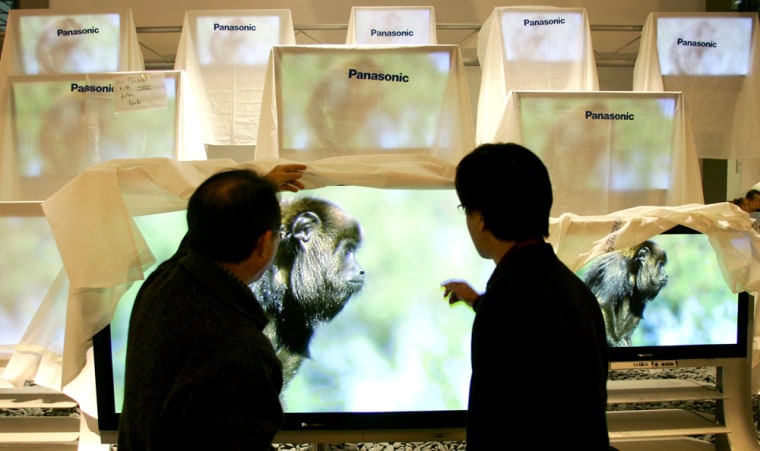Companies like Lucent and Nokia announced new deals to build infrastructure and make mobile phone service faster as providers such as Virgin, T-Mobile and others strive to make TV viewing on tiny cell phones easier and cheaper.
But the underlying current of at the CeBIT tech show in Hanover, Germany, on the final day of press previews belonged to Microsoft Corp. and its marketing campaign surrounding its Project Origami. (MSNBC.com is a Microsoft - NBC joint venture.)
Officials with the Redmond, Washington-based company were tightlipped but that hasn't stopped talk about a likely debut set for Thursday, when CeBIT opens its doors to the public.
Makers of mobile phones, and the companies that provider service to millions of users, meanwhile were touting new high-speed services that will, if their promises hold, deliver television programming from music videos to live soccer to their handsets.
T-Mobile International AG, part of Europe's largest telecom, Deutsche Telekom AG, said it would start making MTV available to subscribers in Germany and Austria, with British customers not far behind. While most of the material will be tailored for T-Mobile's users, some existing MTV programming would be used for the smaller screen.
T-Mobile is in the process of expanding its mobile phone networks, particularly in Germany where it is getting help from Finland's Nokia Oyj to build out high-speed downlink data packet access, or HSDPA, networks. That will give users speeds of up to 14 Mbps, ensuring quick, flicker-free and smooth video downloads.
"We can offer both our business and private customers faster services, such as downloading large files, multimedia and music," said Klaus Jurgen Krath, vice president of RAN Engineering T-Mobile International.
A similar network is to be deployed in Britain and the Netherlands.
The demand for TV on mobile devices is expected to grow from more than 1 million now to as many as 250 million by 2010, ABI Research has forecast, ultimately creating a market worth some US$27 billion.
Add in the sheer number of PDAs and handheld devices and demand by consumers for entertainment, it's a market companies want to pursue.
"The technology is there today to deliver video via IP networks to handheld devices," said Dave Stoner, president and chief operating officer of ViewCast, which develops video and audio encoding solutions to help deliver content.
"The challenges lie in developing a business model for content delivery that makes sense economically; the form factor of the handheld device; and the method of delivery."
European and Asian markets have been quick to embrace such technology, though market penetration lags. In Britain, for example, operators Orange, Vodafone and 3 stream programs over third-generation networks.
O2, which ran a trial service in Britain, found that nearly 80 percent of the people it polled would spend more to subscribe to a mobile TV service, too.
And Virgin Mobile plans to beam broadcast TV to its subscribers later this year.
In the U.S., a recent survey by In-Stat/MDR found that 13.2 percent of wireless customers were very interested in buying video service for their cell phones, too.
To feed that demand for faster speeds, Lucent Technologies said it has received seven separate contracts, with a value of US$300 million, to expand networks in Poland, Russia and for the U.S. Army, among others.
"Our customers' competitive landscape continues to undergo tremendous change as the boundaries between the telecom, media and Internet worlds continue to converge," said Frank D'Amelio, Lucent Technologies' chief operating officer.
The contracts included deals with Kazakhstan Telecom to deploy a new network that will support advanced voice and high-speed data services for business and residential consumers, and enabling more broadband development with Poland's Telecomunikacja Polska that will ultimately lead to voice over Internet calling and television broadcasting via the Internet.
The company also received a contract from the U.S. Army for the European Dense Wave Division Multiplexing-Optical Transport Network project, which will ultimately create a multi-country high-speed optical network.
The Murray Hill, New Jersey-based company will also develop a high-speed CDMA network with Sky Link to serve consumers in Russia.
CeBIT opens to the public on Thursday and is expected to draw nearly 500,000 visitors during its seven-day run. Last year, more than 475,000 people attended the fair.
